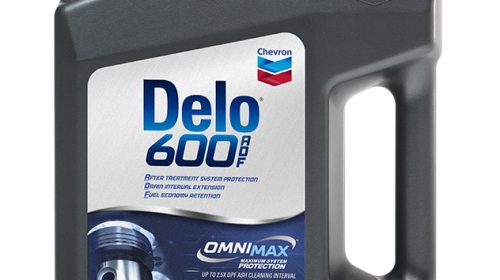Delo 600 ADF with Omnitax debuted last month as a heavy-duty engine oil product delivering maximum protection to both the engine and emissions system in on- or off-highway equipment. While current heavy-duty engine oils bear sulfated ash up to the American Petroleum Institute CK-4 limit of 1 percent, Delo 600 ADF is formulated to a 0.4 percent threshold, which helps drastically reduce the rate of diesel particulate filter clogging.
|
|
| The Delo 600 ADF line includes 15W-40 and 10W-30 grades. |
 |
“Chevron has taken a customer-forward approach by realizing, early on, the extent of the problems caused by the integration of hardware to address the latest emissions regulations and current heavy-duty engine oils,” says NA Commercial Sector Manager James Booth. “Delo 600 ADF significantly reduces the rate of DPF clogging, extending service life by up to 2.5 times, and bringing a 3 percent fuel economy retention advantage over the life of the equipment. We have seen remarkable performance in engine protection too, which will add to the value Delo 600 ADF bring[s] customers.”
The formulation, he adds, meets or exceeds API CK-4 and OEM specifications; has demonstrated excellent oxidation stability in industry, OEM and field tests, thereby providing the opportunity to extend drain intervals; and, shares Delo 400 products’ valve-train wear protection and piston deposit performance.
TIGHTENING REGULATIONS
Chevron Products unveiled the Delo 600 ADF series two years after the API CK-4 service category debut, and during an evolution in diesel engine emission regulations. A key compliance milestone across the industry was the combined use of exhaust gas recirculation, DPF and selective catalytic reduction in 2010 for on-highway and in 2014 for off-highway power. The DPF collects up to 98 percent of particulate matter emissions in the form of ash and soot. Although the latter is mostly combusted in a regeneration cycle, the ash is an incombustible material derived from metallic lubricant additives.
Over time, DPF clogging forces fleet owners to take units out of service to restore the filter function, incur maintenance costs, and sacrifice productivity. If too much soot and ash builds up, the large amount of heat produced upon regeneration can result in DPF damage. Filter clogging increases engine back pressure and regeneration cycles, resulting in a higher fuel consumption. To underscore the value proposition behind a heavy-duty engine oil with low sulfated ash content, Chevron Products maps the potential costs of DPF failure: New filter, $3,000-$7,000; remanufactured filter, $1,500; and, DPF cleaning, $700. — Chevron Products Co., San Ramon, Calif.; www.ChevronLubricants.com
